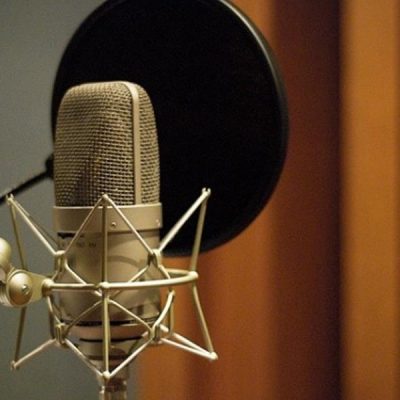doblaje
1. m. En cine y televisión, operación en la que se sustituye la voz original de un actor por otra, en distinto idioma o en el mismo.
En palabras simples el doblaje es el oficio de dar vida a los personajes de un material audiovisual o sustituir de las voces originales de los actores por otras voces, generalmente para traducir del idioma original al idioma del público destinatario del proyecto.
Cortar los mitos y la perfección es el primer paso para empezar a hacer doblaje. Tener un timbre de voz “privilegiado” puede ser una herramienta clave para el trabajo en esta área, sin embargo si te da vergüenza reflejar emociones, por muy bonita que sea la voz el producto nunca estará bien del todo.
Aunque el rostro no queda reflejado en una grabación de voz, por obvias razones, es necesario mover el cuerpo completo y gesticular los movimientos corporales son parte fundamental para que el actor de doblaje interprete en la lectura de su texto las emociones reflejadas en pantalla. Si el personaje llora, debe demostrar tristeza, si está feliz, la voz debe denotar alegría y así con el resto de las emociones.
El cuidado de la voz es de vital importancia para el actor de doblaje, mantener la garganta hidratada, cuidarte del frío, evitar los susurros y no fumar son algunos de los elementos que debes tener en cuenta para mantener en optimo estado tu instrumento.
Hacer doblaje es una experiencia maravillosa que ayuda a desinhibirse y a perder el miedo escénico en cualquiera de las áreas donde nos desarrollemos. Dicen que cuando una persona ama lo que hace no trabaja ni un solo día de su vida y, realmente, no hay labor que se disfrute más que hacer doblaje de voz.
DUB
1. [Transitive verb]
2. to change the sounds and speech on a film or television programme, especially to a different language.
In simple words dubbing is the job of giving life to the characters of an audiovisual material or substitute the original voices of the actors for other voices, in the majority of cases since the original language until the language of the target audience of the project.
Cutting myths and perfection is the first step to start doing dubbing. Having a “privileged” voice may be a key tool for working in this area, however,the shame to reflect emotions it’s the enemy to make a excellent final product.
Although the face is not reflected in a voice recording, for obvious reasons, it is necessary to move the entire body. The body movements are fundamental for the dubbing actor to interpret their text according to the emotions reflected on the screen. If the character is sad, he must show sadness, if he is happy, the voice should denote joy and so with the rest of the emotions.
Caring for the voice is of vital importance to the dubbing actor, keeping the throat moist, taking care for the cold, avoid the whispers and do not smoke some of the items that have an account to keep them in optimum condition.
Doing dubbing is a wonderful experience that helps to disinhibit and lose scenic fear in any of the areas where we develop. They say that when a person loves what he does, not work even a single day of his life and, really, no hay work that is enjoyed more than do voice dubbing.

